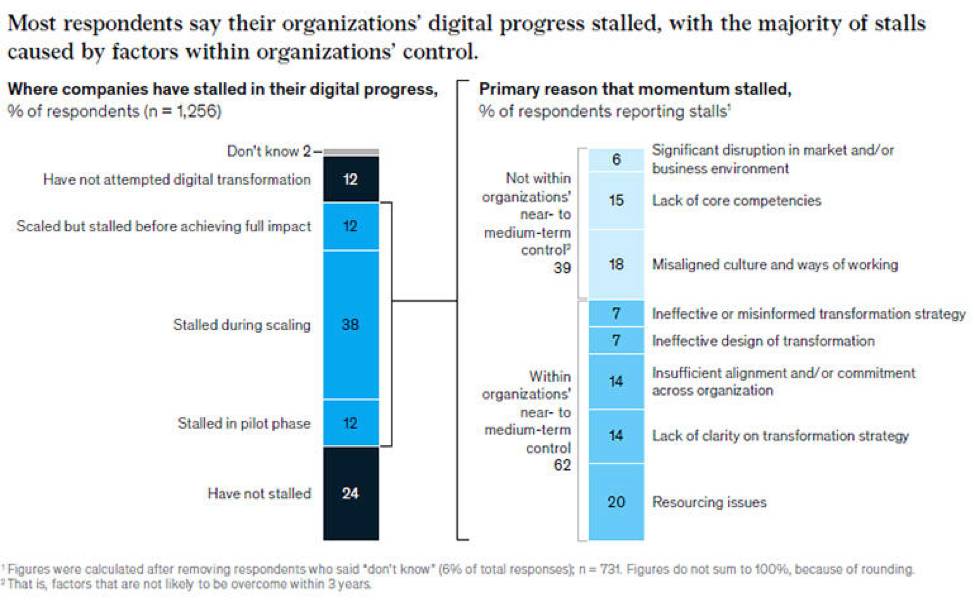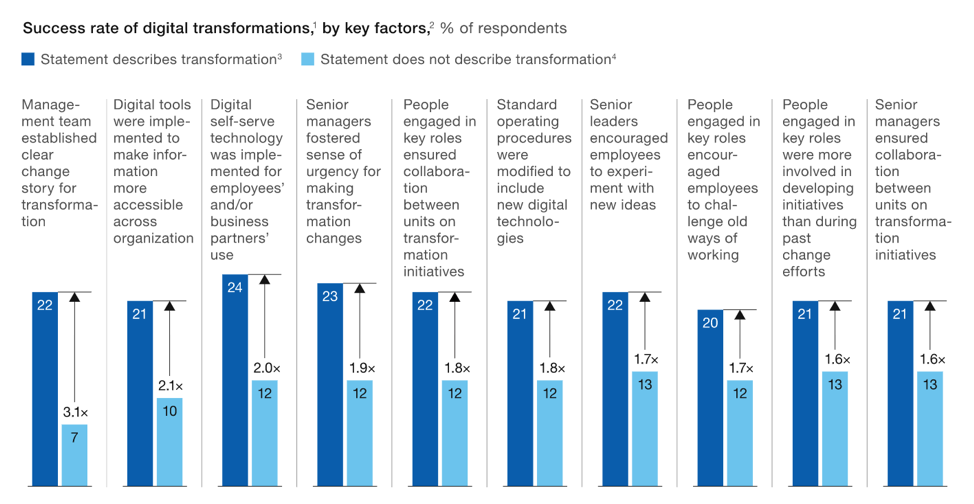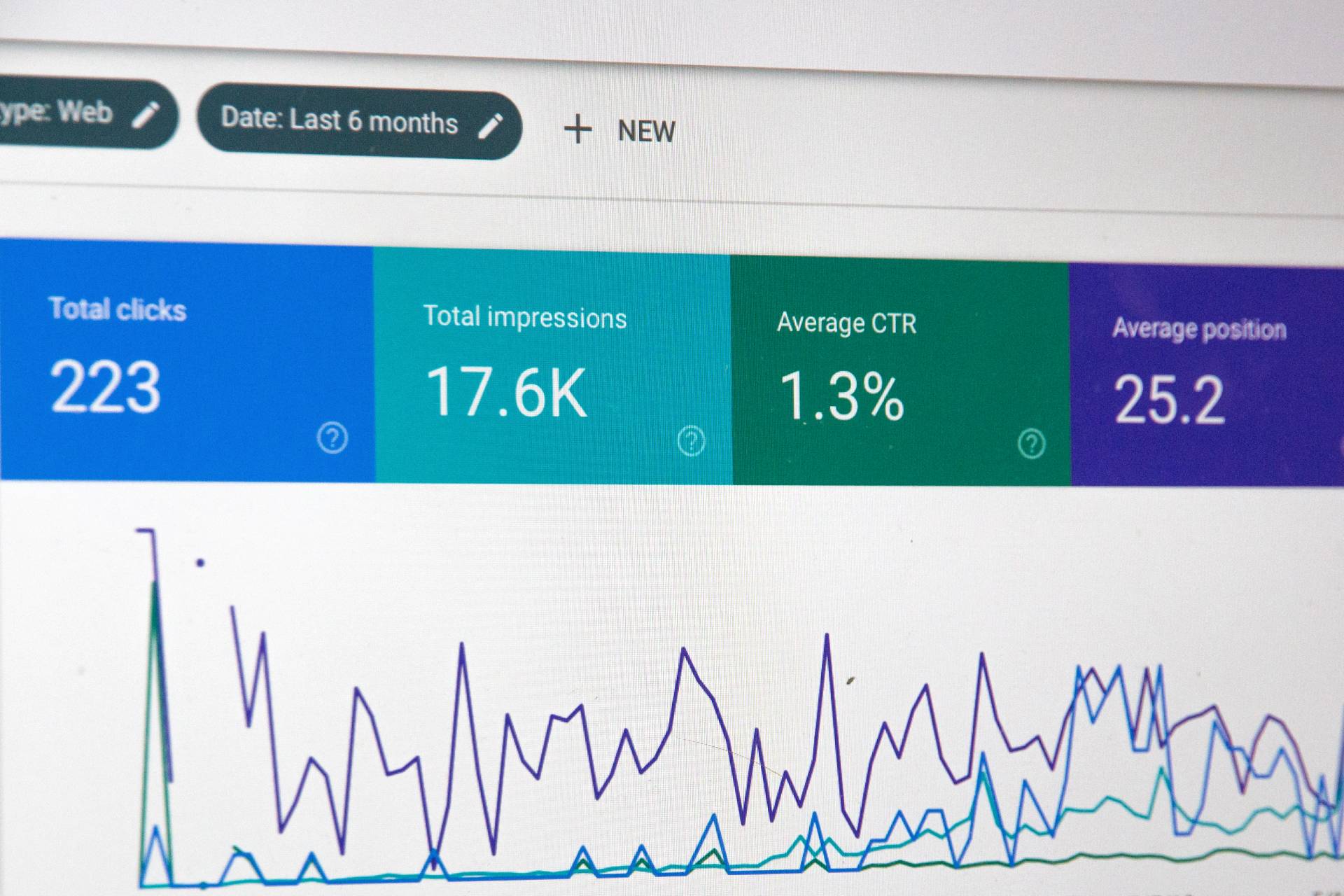The need to boost digital transformation has never been more obvious. The breakneck speed of technology evolution is fueling business and behavioral change across the world. Recently, the Covid-19 pandemic forced many employees to transition to remote work situations in the wake of office closures. Additionally, new trends and emerging technology have pushed many businesses toward an accelerated need for change.
Perhaps, then, this might be the best time for digital transformation in every type of business.
Unfortunately, many businesses fail to utilize their most valuable data resources to make this transition smoother and more successful. Research from Gartner reveals that more than half of companies don’t include data and analytics as key factors in their digital transformation strategy.
Moreover, 62% of companies have experienced stalls during the digital transformation process. McKinsey reported that the most common reasons for these delays were a lack of direction or clarity, ineffective planning or design, and misinformed strategies.

Source: https://www.zdnet.com/article/digital-transformation-spotting-the-winners-and-losers-in-2020/
It’s quite clear that any strategy needs to be built upon a foundation of accurate data to succeed. So why is it any different when it comes time to boost digital transformation?
The fact of the matter is that data needs to fuel decisions throughout any process. Here’s how business leaders need to approach and integrate data along the digital transformation journey.
Boost Digital Transformation by First Identifying Opportunities from Data
For most companies, the process of digital transformation seems incredibly overwhelming. But the fact is that it does not need to happen all at once. Neither do you have to take a formulaic or one-size-fits-all approach.
For instance, digital transformation can give SMBs a much-needed leg-up against their competitors. While they can’t match large corporations’ million-dollar budgets, small businesses can focus efforts on specific areas that make the greatest impact.
Companies of any size can succeed at their efforts to boost digital transformation by solving some of the most significant issues first. Data can provide the roadmap and crucial starting points to get the transformation going.
Say your website’s traffic numbers are high but conversion rates are significantly lower. This could signal an issue with the user experience (UX). You can use data analysis to pinpoint the steps in the buyer’s journey where your numbers start to fall off. Tools such as Google Analytics will tell you which pages on your website people are spending the most time on. Others such as Hotjar will point out how visitors are interacting with those pages.
Make the Customer Journey Easier at All Times
It’s important for every company to focus on cutting costs, improving efficiency, and maximizing revenue. However, since customers (not money) drive business, the real transformation needs to start in customer experience (CX). This warrants that digital transformation takes place beyond marketing campaigns or web/app technology.
The best way to measure and improve CX is by creating a better internal structure that allows the business to personalize interactions. In a study by PTC, C-suite executives agreed that the greatest benefit to digital transformation was improving the customer journey. The report found that providing employees with the right information and tools was the best way to do this.
A good starting point is using data tools to create complex, data-driven customer journey maps. The entire organization can have the tools they need for better decision-making simply by monitoring the audience’s behavior. AI-powered algorithms can take these data points and transform them into actionable journey maps that show what needs to be done to keep customers engaged, retarget them, and close the deal.
Track Both Qualitative and Quantitative Data
To truly unlock the power of data, it is important to understand the difference between qualitative and quantitative.
- Quantitative data is usually affixed to a numbering system. These are common metrics that businesses track, like revenue per quarter or the number of leads generated per channel.
- Qualitative is a bit more difficult to organize since it is based on variables instead of specific numbers. This requires more advanced technology to categorize, especially for metrics like customer sentiment.
These two data types need to be used together to truly boost digital transformation. This goes beyond just stating that quantitative data is measurable in numbers while qualitative data is based on characteristics.
For example, if you’re conducting marketing research for the launch of a new product, your team should be collecting and analyzing both types of data from consumers in order to deliver a product that has market fit. You need to use automation as well as AI technologies, such as natural language processing and predictive analytics. This lets you combine hard data (quantitative) and uncategorized data (qualitative) for accurate insights.
Separate the Transformation Strategy from the Data
The quickest way to make organization-wide positive changes is to make data accessible for strategizing and decisions.
According to a McKinsey study, companies that successfully implemented digitalization derived the greatest benefits by providing employees with better tools. Complement this by making information accessible across all departments and creating digital programs to assist customers and employees.

McKinsey also found that the greatest barrier to transformation was a lack of leadership and direction through the transformation process. Robust data sources and top-of-the-line analysis programs are useless unless your entire team knows how and when to use them.
To make the transition more seamless, you can start with specific types of transformation. For most organizations, there are four key approaches:
- Business Processes: Applying technology for system support, such as inventory management or automation.
- Model Transformation: Incorporating technology to improve an aspect of the industry, such as digitization.
- Analytics: Centralized performance monitoring of all initiatives, especially digital, with end-to-end observability.
- Organizational Transformation: Integrating new systems to support the internal workings of a company, such as collaboration tools and data-sharing technology.
No matter which approaches your business goes with, you need to support every new strategy or system with data. Then monitor the results of these changes to see what is making a positive or negative difference.
It’s Your Turn to Boost Your Company’s Digital Transformation
There is so much potential that companies of any size can unlock if they have the data to do it.
Data analytics, processing, and organizational tools are critical pieces to the puzzle of digital transformation. Leaders must understand how to interpret the data they collect before, during, and after the digital transformation process to ensure continued success. Good luck!

